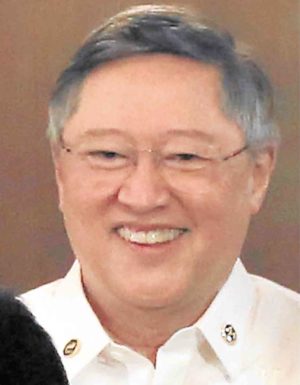
Dominguez
The government is mulling over the issuance of samurai bonds in Japan while firming up the upcoming sale of panda bonds in China, Finance Secretary Carlos G. Dominguez III said.
“We will consider issuing samurai bonds in the future,” Dominguez said in a text message to reporters, referring to yen-denominated debt paper issued in Tokyo by non-Japanese firms.
Dominguez and the Duterte administration’s economic team were in Japan last Monday until Tuesday to firm up Japanese financing for big-ticket infrastructure projects, including the country’s first subway system, as well as pitch the Philippines’ growth story to investors.
From Wednesday to Friday, they moved to China to meet with Chinese government officials also to pitch infrastructure projects to be constructed under the ambitious “Build, Build, Build” program aimed at ushering in the “golden age of infrastructure.”
In Shanghai, the Department of Finance embarked on a non-deal roadshow to promote the upcoming issuance of panda bonds by the Philippine government.
Dominguez had said they planned to issue $200-million in three- to five-year panda bonds by October or November. Panda bonds are yuan-denominated debt paper issued in China by foreign governments or companies.
The Monetary Board, the Bangko Sentral ng Pilipinas’ highest policymaking body, already approved in principle the planned panda bond issuance while the Philippine government was in the process of also securing approvals from the People’s Bank of China (PBOC)
“The panda bond market is regulated by China’s central bank, the PBOC. As such, any potential issuer first applies through the PBOC prior to any other Chinese regulator. As of the moment, we are working with the Bank of China on the internal and external approval by the PBOC. The terms have to be discussed further,” Dominguez said.
In general, “our plan of borrowing 80 percent from the domestic market and 20 percent in foreign currencies remains unchanged. We will therefore remain active in the foreign markets,” according to Dominguez.